Immersive virtual reality (IVR) has emerged as an innovative educational tool for its ability to offer experiential learning opportunities across various fields, including healthcare, engineering, and the military (Bailenson, 2018) by digitally replicating real-world environments. In legal education, VR simulations have shown potential for enhancing students’ understanding of complex scenarios by providing a safe, interactive platform to practice essential skills such as courtroom procedures and trial advocacy. In fact, technology integration in legal education in Bangladesh remains unexplored. This study addresses this gap by investigating the perceptions of law faculty in Bangladesh toward integrating VR simulations into legal education, specifically for developing competencies in pleadings and courtroom advocacy.
Courtroom simulations have been used in legal education to enhance students’ practical competencies, such as presenting arguments and examining witnesses. (Hodge, 2021). In Bangladesh, this practice is rare. Law student faces challenges in gaining practical courtroom experience due to limited resources and time constraints. Lack of accessible role-play simulations facilities in legal education complicates the students’ preparedness for actual legal practice (Nissenbaum, 2019). With the advance of technology, this issue could be alleviated with IVR technology by providing digital simulations. However, despite of its global appeal, the IVR adoption in Bangladesh remains limited due to inadequate infrastructure and faculty training (Kamal, 2020). Lack of research and integration of IVR in Bangladesh's legal curriculum also hampers students' professional competency and risks widening the gap between local and international legal education (Bailey & Bailenson, 2019).
This research aimed at examining the perception of the faculty and administration in Bangladesh toward introducing and integrating of IVR technology with the current legal education instructional methods. The main research questions posed in this study are:
RQI To what extent can immersive virtual reality (IVR) technology transform legal education in Bangladesh, and how do law faculty perceive its potential to enhance student learning, engagement, and professional preparedness?"
RQ2: How does the Law faculty perceive the utilization of immersive VR in legal education in preparing law students for their future performance in the courtroom practice?
This study employed a mixed methods approach to explore the perceptions of law faculty in Bangladesh for getting breadth and depth of insight regarding the integration of immersive virtual reality (IVR) in legal education (Robson and McCartan, 2016 & Stern et al., 2014). A structured online questionnaire was developed on Qualtrics. A representative sample of law faculty from various universities in Bangladesh was selected for this study.
A structured questionnaire was developed to assess various aspects of VR technology in legal education. The survey was designed in six sections e.g., demographic information (11), understanding of VR (2), experience with VR (5), perceptions on enhancing student learning with VR (6), perceptions on VR in legal education (6), challenges and recommendations (2).
The data collection process began with sending a letter of invitation to potential participants via email from 12 September 2024. The participants were provided with a link to the online survey hosted on Qualtrics. The survey was open for one week. By the survey deadline, 88 responses were received. After cleaning the data, 59 responses were deemed eligible for analysis based on completeness and relevance. (Figure 1)
The quantitative data collected from the questionnaire was analyzed using descriptive statistical analysis. Frequencies and percentages were used to summarize the demographic data, levels of understanding and experience with VR, and perceptions of VR’s role in enhancing student learning and its application in legal education. Additionally, Likert scale responses (e.g., Strongly Agree to Strongly Disagree) were used to measure attitudes toward VR’s effectiveness in education. To gain deeper insights into participants' perceptions, a subset of open ended questions were made regarding specific opinions and experiences with VR in legal education, particularly in relation to challenges and recommendations.
The demographic information of this study provides a diverse insight into the participants. For example, gender (76% male, 24% female), age (58% 25-44 age range), affiliation (31 public, 28 private), status (lecturer 17, professor 15), experiences (11-20 years 40%). (Figure 1)
Figure 1
Demographic Information
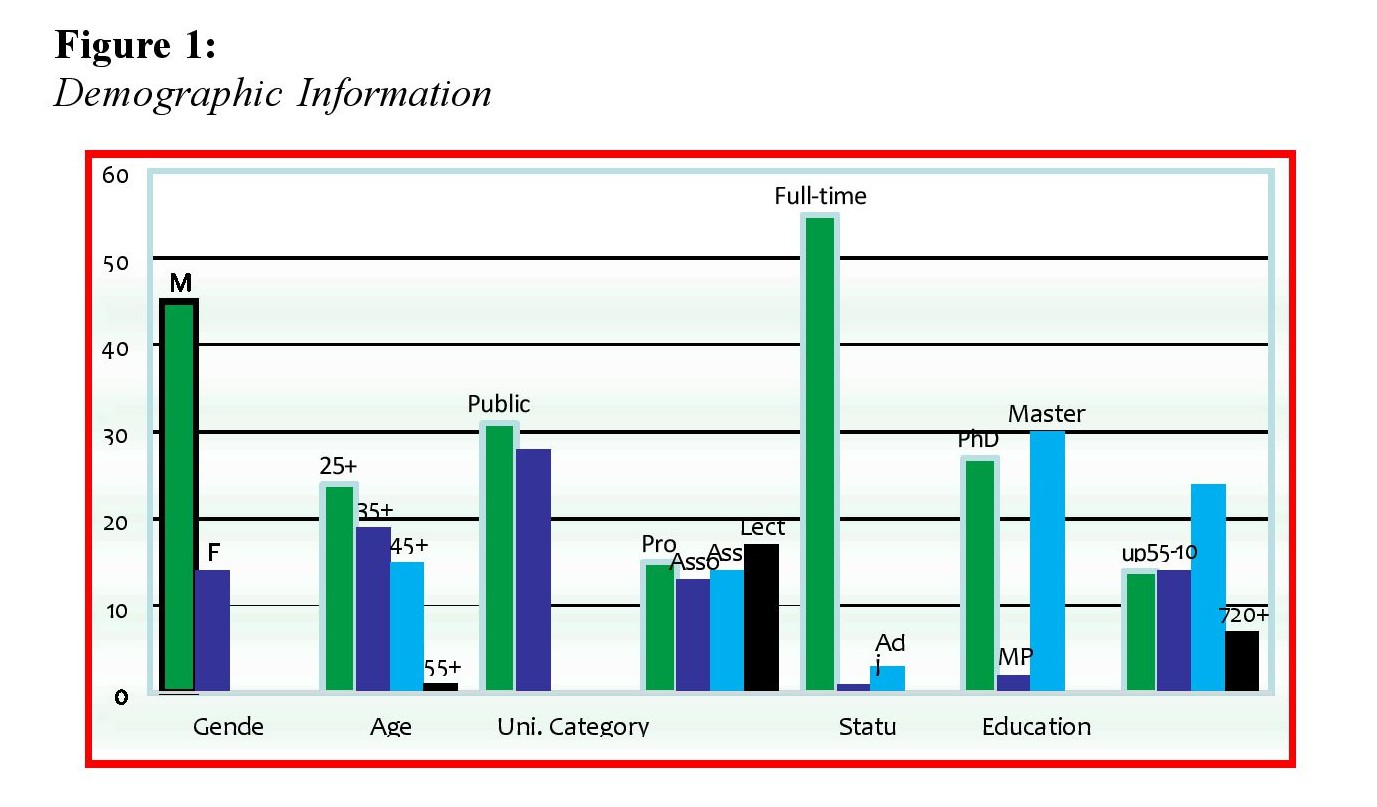
Figure-2 shows that only 2% respondent rated themselves as an expert, while 51% categorized themselves as either beginners or novices. Despite this limited experience, 47% of respondents rated their knowledge of VR's applications in education as “good” and “very good”.
Figure 2
Understanding of VR
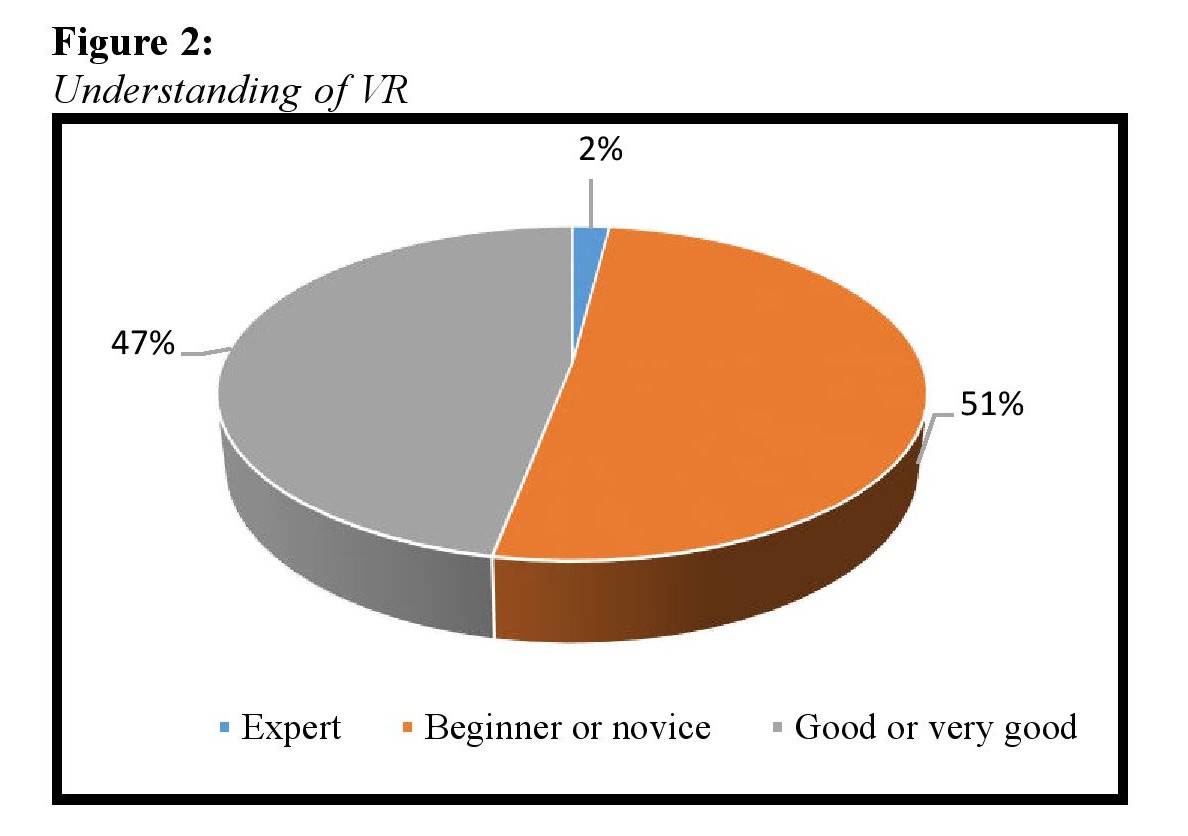
In terms of personal use, 58% of participants reported having used VR, with most common uses of games (54%) etc. However, 42% faculties had no previous experiences with VR technology. [Figure-3]
Figure 3
Experience with VR
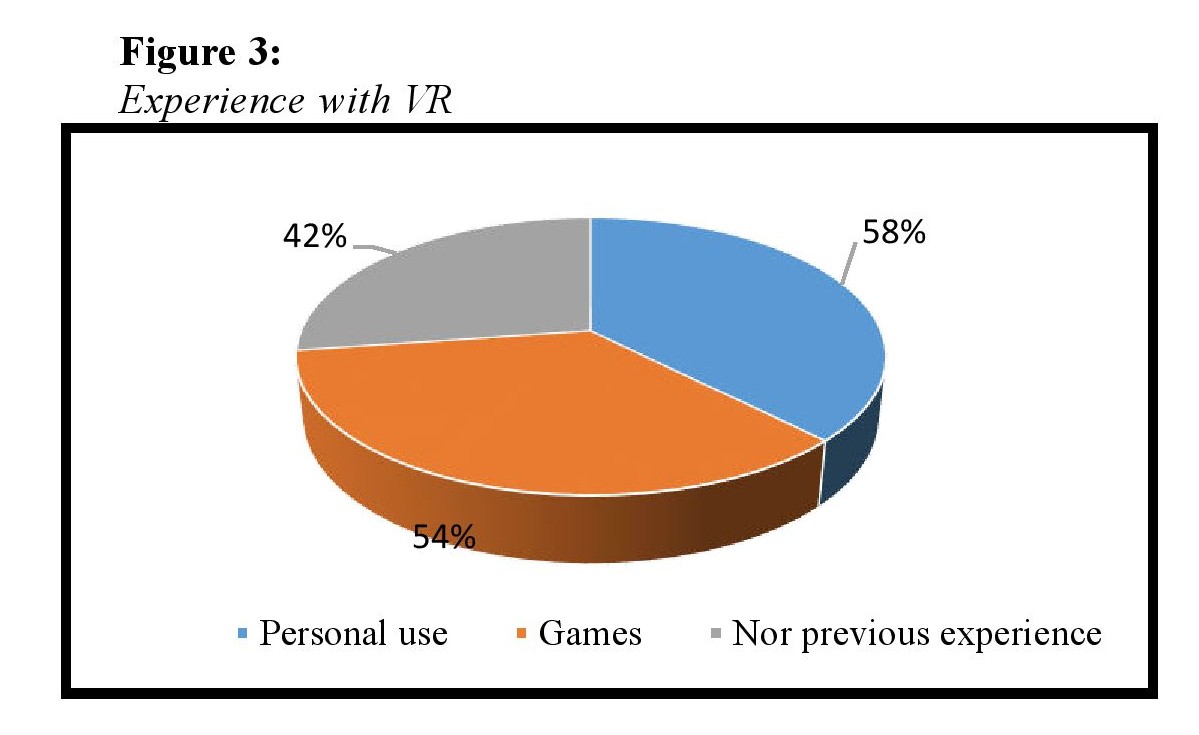
A significant majority of respondents agree that VR has the potential to enhance student learning through interactive and immersive experiences (41 responses), practical hands-on learning (34), and exploration of complex concepts (19). (Figure-4)
Figure 4
Enhance student learning
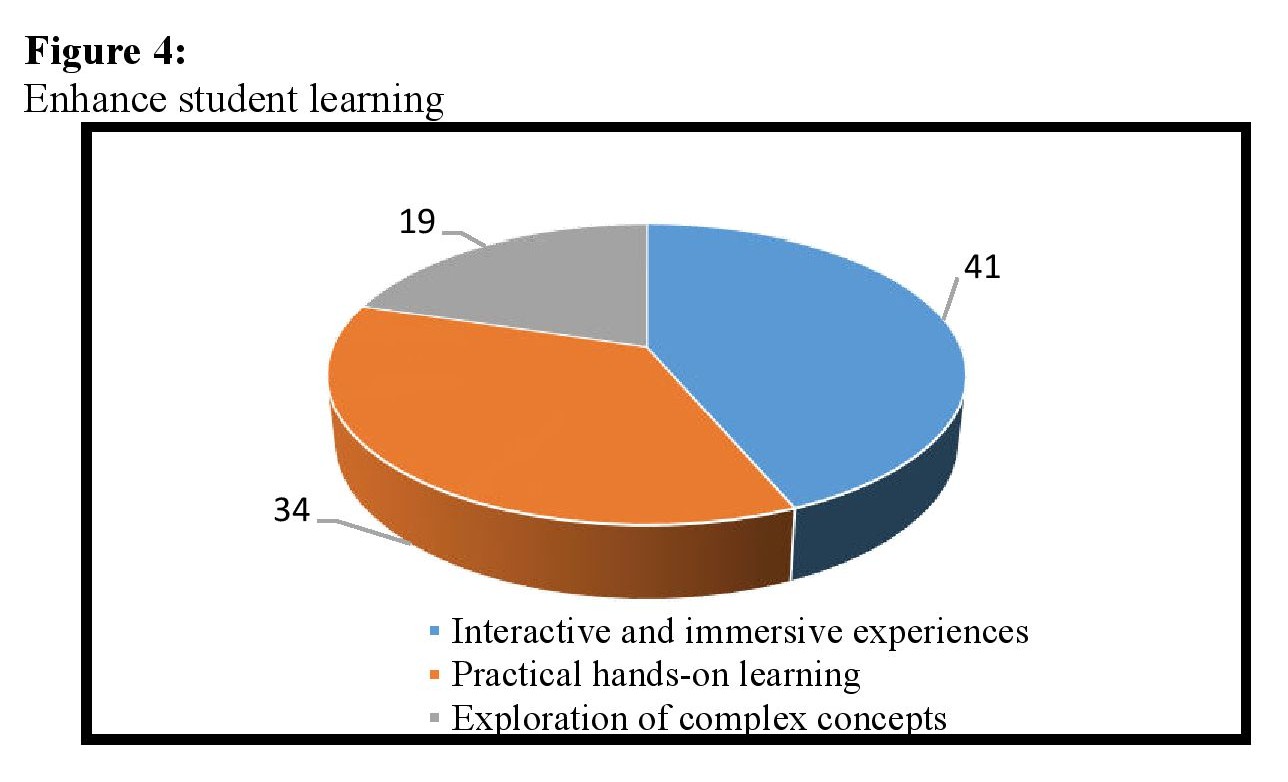
The study reveals varying levels of agreement among respondents regarding the potential benefits of Virtual Reality (VR) in legal education. The statistics shows that perception averages start from 3.61 and end with 4.20 along with the standard deviations range from lowest 0.49 to highest 0.93. Strong agreement is found among the participants (mean value 4.00 and above) for example, better and longer retention (M=4.20, SD=0.60, cultivating empathy (M=4.00, SD=0.64), help student learn legal abstract concept (M=4.00, SD=0.71), effective simulation in conducting cases (M=4.07, SD=0.69),
Moderate agreement is reflected with the potential of VR by effectively illustrating complex legal structures (Mean = 3.98, SD = 0.68), helping students understand changes (M = 3.97, SD = 0.49), increasing students’ interpersonal communication skills (M= 3.92, SD = 0.59), providing collaborative learning opportunities (M= 3.90, SD = 0.68) and helping students learn abstract concepts in scientific ( (M= 3.86, SD = 0.93) and affective domains (M= 3.81, SD = 0.70).
Some abstract concepts show relatively lower agreement with the potential of VR such as, psychological domain (M= 3.64, SD = 0.92), political domain (M= 3.61, SD = 0.80), financial domain (M= 3.69, SD = 0.87), affective perception, such as sympathy and empathy (M= 3.71, SD = 0.74).
The highest standard deviation is observed in VR’s potential to help students learn abstract concepts in the social domain (SD=0.95, scientific domain (SD = 0.93) and psychological domain (SD = 0.92), which implied that the participants had more diverse perception on using VR to enhance students’ learning abstract concepts in these domains. The lowest SD is found in VR’s potential to help students understand changes that take a long time to be detected or perceived (SD = 0.49) and could increase students’ interpersonal communication skills (SD=0.59).
Table 1
Perception on potential benefits of VR in Legal Education
SL | Subject | Mean | SD |
|---|---|---|---|
1 | Help students remember information better and longer? | 4.20 | 0.60 |
2 | Cultivate empathy in students by allowing them to experience different perspectives | 4.00 | 0.64 |
3 | Increase students’ interpersonal communication skills | 3.92 | 0.59 |
4 | Enhance interpersonal relationships among students by providing collaborative learning opportunities | 3.90 | 0.68 |
5.1 | Help students learn abstract concepts of various categories-Scientific | 3.86 | 0.93 |
5.2 | Help students learn abstract concepts of various categories-Psychological | 3.64 | 0.92 |
5.3 | Help students learn abstract concepts of various categories- Affective | 3.81 | 0.70 |
5.4 | Help students learn abstract concepts of various categories- Social | 3.73 | 0.95 |
5.5 | Help students learn abstract concepts of various categories- Legal | 4.00 | 0.71 |
5.6 | Help students learn abstract concepts of various categories- Political | 3.61 | 0.80 |
5.7 | Help students learn abstract concepts of various categories -Financial | 3.69 | 0.87 |
8 | Illustrate complex legal structures and systems effectively that are visually obstructive in traditional teaching methods. | 3.98 | 0.68 |
9 | Help students understand changes that take a long time to be detected or perceived (e.g., historical legal developments) | 3.97 | 0.49 |
10 | Enhance students' affective perception through immersive experiences | 3.71 | 0.74 |
11 | Provide effective simulation for law students to conduct cases in the court | 4.07 | 0.69 |
Respondents identified several barriers to VR integration in legal education, with the lack of technical expertise 71% (42 responses) and the high cost of VR equipment 51% (30) being the most significant challenges. Additionally, 59% (35) noted limited availability of VR content for legal education, and 31% (18) mentioned resistance to change from faculty and administration.
Figure 5
Opinion about challenges
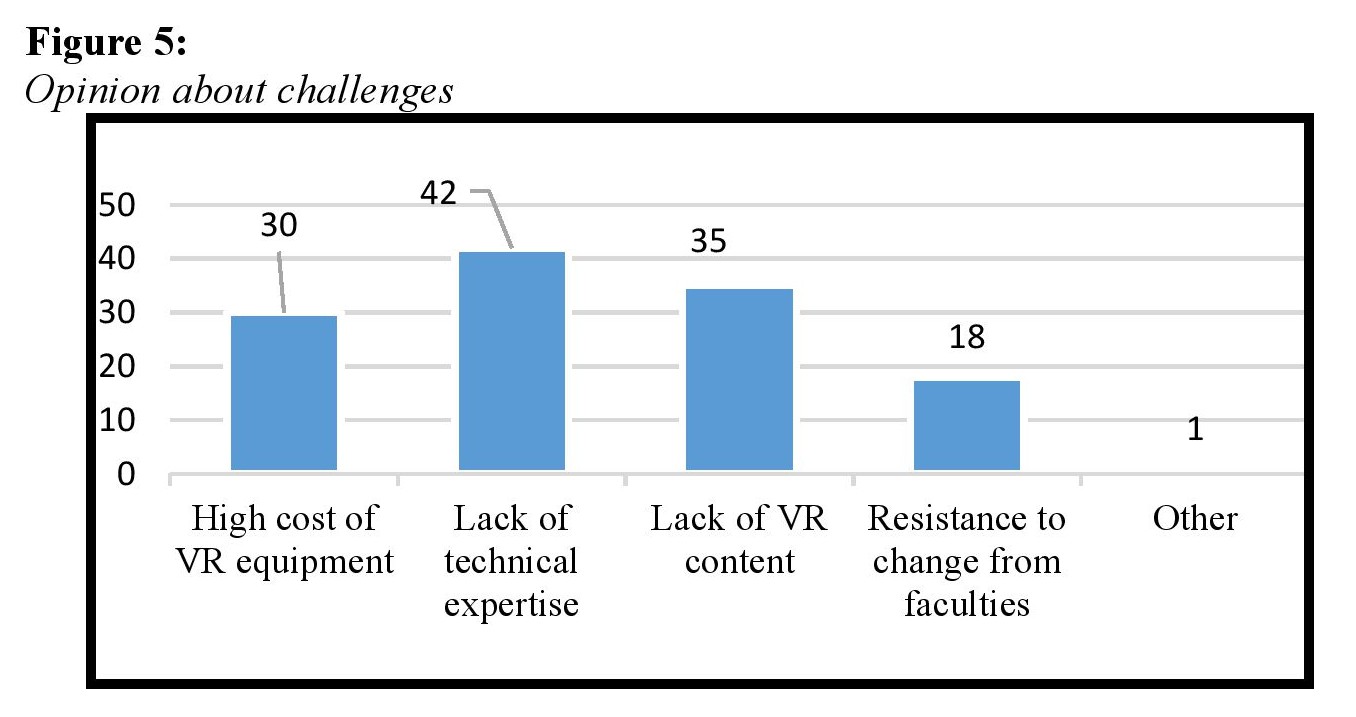
This study sheds light on the significance of integrating immersive Virtual Reality (VR) into legal education in Bangladesh. The findings regarding the knowledge of VR application in education (47%) suggest an openness attitudes among law faculty in Bangladesh toward the potential benefits of VR in legal education. A significant majority of respondents found the potential to enhance student learning through interactive and immersive experiences (70%), practical hands-on learning (58%), and exploration of complex concepts (32%). The findings of this study also underscore the significant potential of VR in transforming legal education in Bangladesh. Key results reveal strong faculty support for VR in areas such as memory retention and courtroom simulation. VR’s capability to enhance abstract learning, particularly in legal contexts, demonstrates its alignment with educational needs. However, lower agreement (but commonly acceptable as standard mean) was observed in areas like abstract concept in psychological, political, and financial domains, as well as affective perception, such as sympathy and empathy. In fact, VR has been effectively used for enhancing students’ development of sympathy and empathy or other soft scientific domains, e.g. psychology (Bailenson, 2018; Herrera et al. 2018 & Freina and Ott, 2015). Thus professional development opportunities may help the faculty in Bangladesh to explore the use of IVR in these domains. Integrating VR into the curriculum could enhance law students' competencies, improve practical training, and align legal education in Bangladesh with global trends. Policymakers and educators should focus on addressing the challenges to maximize VR's impact. These findings provide a foundation for future research and practical interventions to revolutionize legal education through immersive technologies.